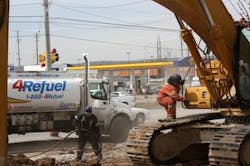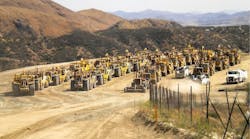Times are tough and money is tight. How can you invest the time and money necessary to make our planet greener while your company is struggling? It’s no secret that many green initiatives require massive capital expenditures and changes in policies by government, but is there a green solution that actually saves you money?
The environment has become the No. 2 issue behind getting the economy back on track. Fossil fuels will continue to be the No. 1 fuel despite President Obama’s green plan to develop new sources of power. The Senate Finance Committee approved billions in tax credits and financial incentives to boost alternative energy supplies and promote conservation.
The good news is that clean air policies are starting to have an impact, and this is only the tip of the iceberg. In the past few years, environmental issues have moved from the background to the forefront for many industries, and although we have a long way to go, we have made some progress.
Improving air quality
According to a study published in 2009 by the New England Journal of Medicine, efforts to cut air pollution in the past few decades have helped increase life expectancy in the general population. The article gives comprehensive evidence that shows air quality improvements can have a measurable effect on health. Researchers discovered that, on average, reductions in fine particulate air pollution in the past few decades increased life expectancy by about five months for those living in 51 U.S. cities included in the study.
“This tells us that continued efforts to improve air quality, even in only moderately polluted cities, should result in improved life expectancy,” said lead author Arden Pope. Much of the fine particulate matter in the air we breathe comes from industrial activities and burning fossil fuels.
Fine particulate air pollution is associated with an increased risk of various health issues, ranging from breathing problems to decreased lung function and heart attacks. Research has suggested that long-term exposure to fine particulate matter can dramatically increase the risk of dying from heart disease or stroke.
“The evidence clearly suggests that the reason we’re seeing increases in life expectancy is because we have a reduction in an important risk factor, in this case air pollution, to cardiopulmonary disease generally,” said Pope, professor at Brigham Young University in Utah.
Cut fuel use
Contractors can make a difference. Your business relies on fuel, which is the No. 1 cost after labor. You can’t work without fuel, but you can cut the amount of fuel consumed and eliminate thousands of tons of toxic air pollutants.
Consider how you manage your fuel. Automated systems are available today that help you understand exactly what your fuel consumption needs are and where fuel is being wasted. When you cut consumption, you cut toxic emissions. Here is what you can do:
1. Adopt new eco-friendly refuelling practices. Are you traveling to and from card-locks or a central refuelling station? The extra mileage wastes fuel and causes unnecessary emissions, but when tanker trucks refuel your equipment while idle, it improves your productivity by eliminating 20 minutes per fill on average.
You can easily save 10 to 15 percent of the fuel you consume if you have your fuel delivered. An equal amount of emissions is eliminated. When you calculate those numbers based on the size of your fleet over a period of months, the reduction in greenhouse gases is staggering.
2. Improve fuel efficiency by smarter driving habits. Poor driving habits waste fuel, and excessive idling and jackrabbit starts are the two biggest culprits. Pre-planning routes will cut unnecessary miles and save fuel, too.
3. Set up a training and rewards program for your drivers. Make employees aware of how they can cut greenhouse gases by practicing eco-friendly driving habits. You can eliminate wasted fuel and pollutants quickly and without any cost by educating your drivers and equipment operators. Once they know the effect they have on the environment, they can make changes. Begin a green reward program for the best operator each month to build morale.
4. Measure it and reduce it. Are you managing your fleet effectively? Until you know exactly where each drop of fuel is going, you can’t make any changes to cut consumption. Telematics and data-capture technology are available to measure the key operating information; fuel-management systems provide accurate data on each piece of equipment to help cut fuel and emissions. Once you know where fuel is being wasted, you can manage it to cut costs, consumption and emissions.
5. Use cleaner, greener bio-fuels wherever possible. Renewable fuels are available today and they are not more expensive, but they can have a huge impact on your carbon footprint. Consider the use of biodiesel as part of your fuel mix. Biodiesel is a mix of traditional diesel fuel with renewable vegetable oils and rendered fats.
Reduce greenhouse gases
If you start by using a B20 blend, (20 percent biodiesel) you can expect approximately a 15-percent reduction in greenhouse gas emissions without expensive engine conversion.
Fuel is often looked at as a “dirty business.” It’s tough to erase images of the epic oil spills from our minds, and we are afraid of causing even the smallest fuel spills, which can stain the environment and bring costly clean up bills. When you switch to a complete fuel-management system, you no longer have to take a chance on using unqualified people handling, transporting and refuelling. Certified refuelling professionals will deliver and refuel your trucks, equipment or tanks efficiently and safely to eliminate all risks.
Your new clean air strategy pays you cash back, too. Every time you cut wasted fuel, it saves you money. You can calculate how much you save when you look at your fuel bill every month. Could you use that extra savings for other projects or cut your bottom line operating expenses?
With a fuel-management system working to cut fuel consumption and emissions, you will save thousands of dollars on your fuel bill. That’s a breath of fresh air.
--Jack Lee is executive chairman and founder of 4Refuel Canada Inc., an online fuel management company.




